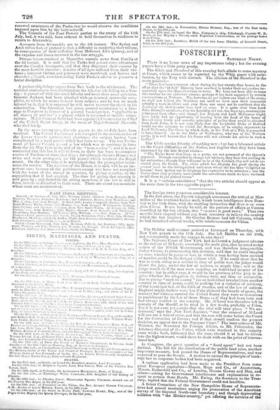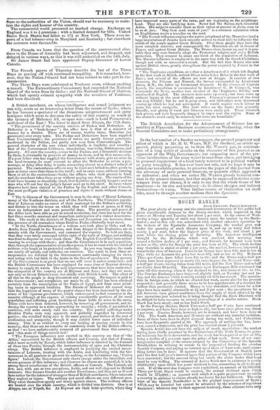The Halifax mail-steamer arrived at Liverpool on Thursday, with New
York papers to the 17th July. She left Halifax on the 20th, and consequently made the voyage in nine daysi
The Supreme Court of New York had delivered a judgment adverse to the release of M`Leod ; overruling the main plea, that he acted under orders of the British Government, and was therefore irresponsible. _ Judge Cowen, in pronouncing this decision, said that he could imagine no case, whether in peace or war, in which a man having been accused of murder, could be discharged without trial. If he could show that he was in truth acting as a soldier in time of public war, the judge would direct the jury, under the law of nations, to acquit him ; and so the judge would do if the man were resisting an individual invader of his country : but in either case, it wculd be the province of the jury to in- quire whether his allegation in defence were not false or colourable. But to pursue " such an enemy" (as an individual invader) into another country in time of peace, could be nothing but a violation of territory, of the municipal law, of the faith of treaties, and of the law of nations_ England might declare war ; but if she claimed the benefit of peace, the moment her citizens entered the United States they were as obnoxious to punishment by the law of those States'as if they had been born and had always resided in the country. Mr. M`Leod was therefore left in- custody of the Sheriff, to be tried in a few weeks, probably at Utica. But it is not even yet certain that the trial will take place. " We un- derstand," say s the New l'orh Inquirer, "that the counsel of M`Leod will sue out a writ of error, and that the case will come before the Court for the Correction of Errors ; and if that should confirm the present decision, an appeal lies to the Supreme Court." The instructions of Mr. Webster, the Secretary for Foreign Affairs, to Mr. Crittenden, the Attorney-General of the Union, which were received in this country some weeks back, intimated that the case, should it at last be driven' into the highest court, would there be dealt with on the point of interna- tional law.
In Congress, the great question of a " fiscal agent" had not been' decided. The bill for the distribution of the public land sales, another important measure, had passed the House of Representatives, and was' expected to pass the Senate. A. motion to extend the principle of bank- rupt-law to corporate bodies had been negatived.
A curious application had been made to the President from some great European capitalists—Messrs. Hope and Co., of Amsterdam,. Messrs. Rothschild and Co., of London, Messrs. Gowan and Max, and others—asking for -Government interference and explanations in re- spect to certain State Bonds. Mr. Ewing, the Secretary to the Trea- sury, replied that the Federal Government could not interfere.
A Select Committee of the New Hampshire House of Representa- tives had passed resolutions urging the prosecution of the American survey of the disputed North-east boundary ; and though deprecating collision with " the Mother-country," yet offering the services of the State to the authorities of the Union, should war be necessary to main- tain the rights and honour of the country.
The commercial world presented no marked change. Exchange on England was 8 to *premium ; with a limited demand for bills. United States Bank Shares had fallen to 17f at New York. There were re- ports of a bad tobacco-crop in Maryland and Kentucky ; but elsewhere the accounts were favourable.



























 Previous page
Previous page